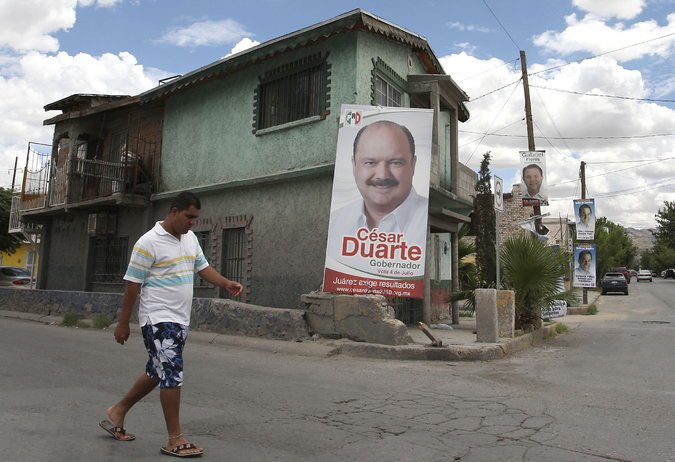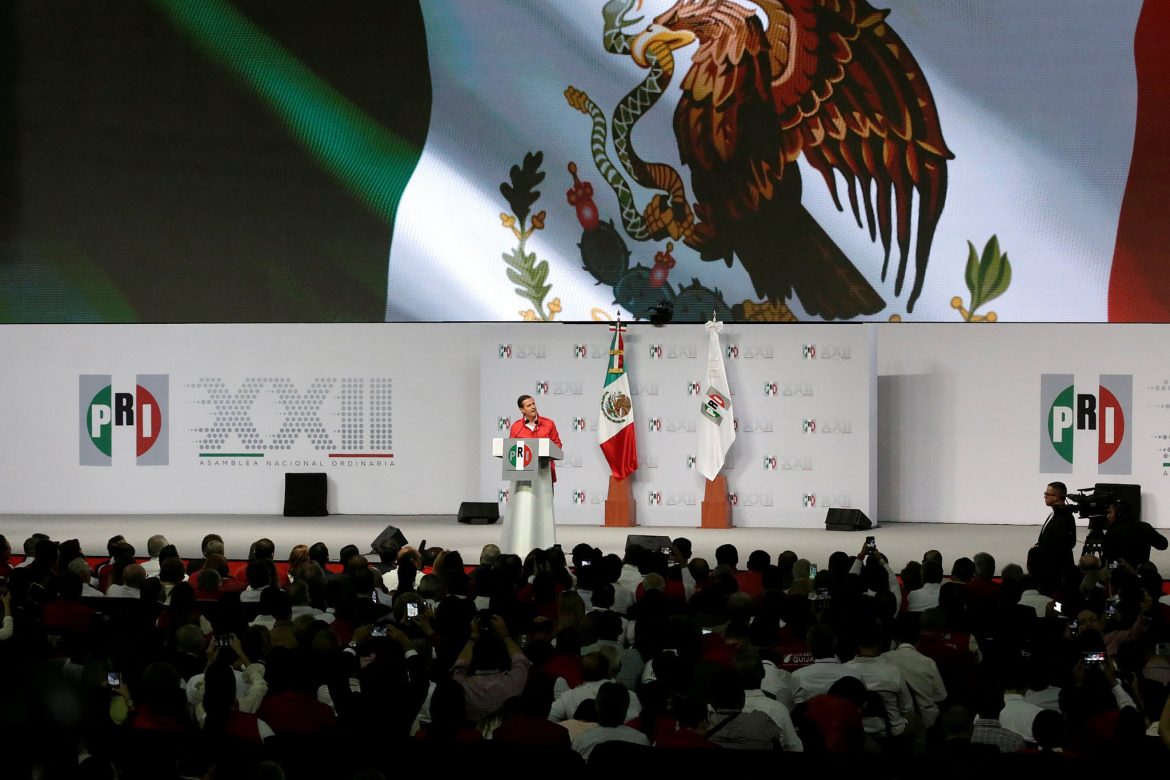This material belongs to: The New York Times.
CHIHUAHUA, Mexico — A former deputy in President Enrique Peña Nieto’s party has been arrested as part of an investigation into the illegal use of public money to fuel his party’s campaigns in Mexican elections last year, state officials announced on Wednesday.
The former deputy, Alejandro Gutiérrez, is one of several allies of Mexico’s president suspected of taking part in an embezzlement scheme to propel his party’s chances at a time of deep dissatisfaction with the government, according to former officials connected to the scheme and hundreds of pages of documents reviewed by The New York Times.
The arrest of Mr. Gutiérrez, a veteran figure who helped control the finances of the governing Institutional Revolutionary Party, or PRI, is part of a widening inquiry into the enormous corruption that occurred under the previous governor of the state of Chihuahua. The governor was a close friend of Mexico’s president and a rising star in the party before he fled to the United States to avoid corruption charges.
The case against him has already ensnared more than a dozen former state officials, some of whom are now cooperating with the authorities.
But the investigation is spreading and threatens to reach the highest ranks of government, according to testimony from the former state officials and financial records obtained by The Times.
Mr. Gutiérrez is being investigated in connection with what former state officials call a nationwide plan to funnel tens of millions of dollars in public money to help the party’s candidates in gubernatorial elections in 2016.
The money was sent to states with friendly governors in the party, who then created a trail of government contracts with fake companies that ultimately sent the money back for use in campaigns, according to the testimony and records.
At the time, top officials in the PRI were worried about losing the state elections in June 2016. The former state officials say the pattern of embezzling money to finance elections occurred in several states where the PRI was frightened of losing control.
The documents reviewed by The Times focus largely on the embezzlement scheme in Chihuahua. According to the records, millions of dollars were transferred in January 2016 from the federal government to the state for the purpose of education.
The funds were then shuffled and diverted to four companies used to embezzle money — businesses that the nation’s tax auditor has blacklisted as front companies, according to the government contracts reviewed by The Times.
Those companies, supposedly hired by the state of Chihuahua to provide educational services, received around $14 million in their accounts, according to the contracts and the bank records showing that the money had been received.
But the companies provided no such services, according to affidavits from current education officials in the state. Instead, the money was turned into cash and returned to the PRI to be used for election campaigns, according to the former state officials connected to the scheme.
One of them, Ricardo Yáñez, the former minister of education in Chihuahua, described the plot in a sentencing document. He is serving a four-year prison sentence.
Not all of the money went to politicking, however.
About $230,000 was deposited directly into a business account operated by Mr. Gutiérrez, the former PRI deputy, according to bank records and witness testimony.
The governor of Chihuahua announced the arrest on Twitter on Wednesday evening, describing it as a “joint operation with the federal and state police.” The governor said that Mr. Gutiérrez had been charged with embezzlement.
The federal Finance Ministry denied that any illicit payments had been made, contending that the nation’s budget system had been “strengthened with strict controls” on multiple fronts “to guarantee” accountability in the use of public resources.
But the trail of payments outlined in the documents suggest a tie between the embezzlement scheme and the party at a national level.
Contracts and bank records show that millions of dollars went to some of the same phony companies, or companies connected to them, in the states of Sonora and Durango. Bank records also show hundreds of thousands of dollars in deposits to some of the companies by the state of Colima. And in their testimony, the former state officials connected to the scheme said it was carried out in the states of Veracruz and Tamaulipas.
State officials in Veracruz did not respond to repeated requests for comment. And the current governor of Tamaulipas, an opposition politician who won his seat during the 2016 elections, said a review by his employees found no contracts with the four main fake companies.

It is still unclear who else may have taken part in the scheme.
In the sentencing document, Mr. Yáñez, the state education minister who has already been convicted, is quoted as saying that both Mr. Gutiérrez and Chihuahua’s former governor, César Duarte, told him that the money had been sent from the federal government to finance the party’s election campaigns. He said they told him the same plan had been carried out in several states.
Mr. Duarte has fled to the United States, where he is avoiding federal and state corruption charges, including allegations that he stole more than $300 million while in charge of the state.
Mr. Duarte’s daughter is an American citizen, and according to legal documents reviewed by The Times, the former governor applied for a green card.
Mr. Duarte is believed to be living in Texas and New Mexico. Attempts to reach Mr. Duarte by phone and through visits to 10 properties in and around El Paso that are believed to belong to him were unsuccessful.
The head of Mr. Peña Nieto’s party at the time of the campaign finance scheme, Manlio Fabio Beltrones, has long been allied with the president and his family.
Mr. Beltrones is also named in the sentencing document. Mr. Yáñez said he was told by the former governor that Mr. Beltrones had hatched the plan. Attempts to reach Mr. Beltrones on Wednesday were unsuccessful.
In the document, Mr. Yáñez said that he met with Mr. Gutiérrez, the former PRI deputy, and other officials at the party’s headquarters in Mexico City. At that point, the PRI had already lost the election and the mind-set of the participants switched to damage control.
The campaign cases are part of a wide-ranging investigation underway in Chihuahua, where the new governor, Javier Corral, has assigned his attorney general to delve into corruption.
The leeway that prosecutors have been granted by Mr. Corral is rare in Mexico, where investigations are seldom begun and, if permitted, rarely reach higher than low-level functionaries.
Over months, prosecutors have slowly worked their way through a roster of former officials who served under the previous governor, Mr. Duarte, pressuring them to cooperate.
In January 2016, the state of Chihuahua was facing financial headwinds and needed help making payroll. Jamie Herrera, the former state finance minister under Mr. Duarte, needed nearly $16 million to ease the financial strain.
Two days later, in a seven-page contract, the federal Finance Ministry granted the request. According to the governor’s office, a two-day turnaround for such a large request was staggeringly fast.
But the reason for the transfer, according to the former state officials, was a hoax. In reality, they said, Mr. Gutiérrez, the former PRI deputy, had called officials in Chihuahua to have them to ask for the money from federal officials, the testimony shows.
The operation, the state officials explained, was a complex, tried-and-true way to embezzle funds. The officials were given the names of four companies that would supposedly provide educational services for the state — front companies from which party operatives could siphon the money.
One company received about $5.2 million for selling the state human resources software.
Three other companies were paid millions for training and educational services, according to the contracts reviewed by The Times.
According to contracting specialists, the amounts paid by the state were astronomically high for the services they provided.
The payments moved swiftly. By the end of February, contracts had been drafted and signed by the state officials, and by April the checks were cut to each of the companies.
Of the roughly $15.8 million sent to the state by the federal government, the party only asked that $14.4 million of it be returned to it, according to the testimony from state officials. The rest, they said, could be spent as officials in the state saw fit.
From each of the companies, the money was then transferred to dozens of other companies, several of which also appear on the national tax authorities’ blacklist of front companies, according to the documents.
From there, it disappeared. The only clue as to where it went lies with the testimony of the two former state officials, who were told by party officials that the money was turned into cash spent on campaign financing.


